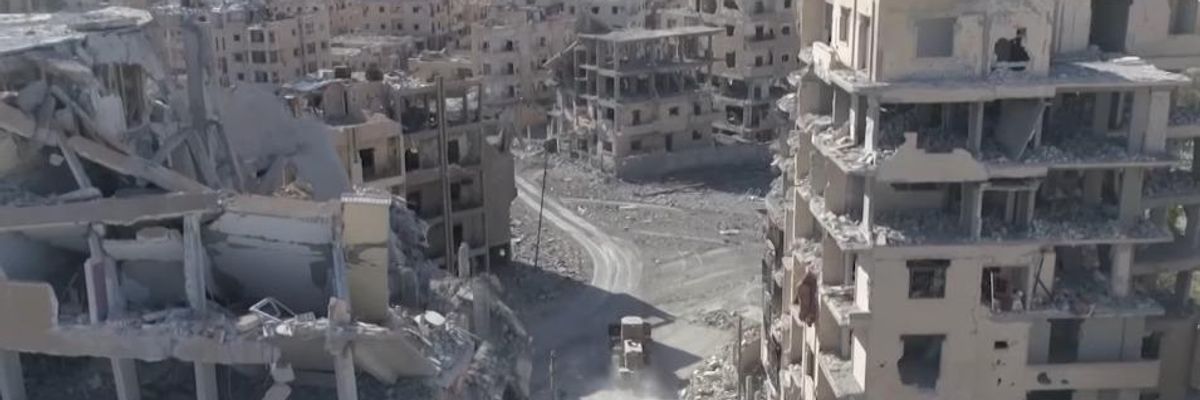With the city largely turned to rubble and nearly 300,000 people now seeking refuge from the devastation, it appears that the city of Raqqa--the capital claimed by the Islamic State (ISIS) in Syria--had to be destroyed in order to be liberated.
"The international community invests vast amounts of money on military action, but only a fraction of that for helping the children and families who suffer the consequences." --Sonia Khush, Save the Children
On Tuesday, Brig. Gen. Talal Sillo told the Associated Press that there are no longer clashes going on in the city.
And though the U.S.-backed Syrian Democratic Forces (SDF), led by Kurdish militias and its multi-ethnic allies, declared victory over IS fighters after a final round of battles, the city itself has been "comprehensively wrecked."
The scale of the destruction in Raqqa was captured in this drone footage show posted online Tuesday:
As Roy Gutman's headline for The Daily Beast read eaerlier this year, "The U.S. Is Destroying Raqqa in Order to Save It, and Civilians Be Damned."
"Whole neighborhoods are being bombed flat with little or no regard for civilians trapped inside," Gutman wrote. "It's 'like dropping a nuclear bomb in stages.'"
The Syrian Observatory for Human Rights, a UK-based monitoring group, reports that at least 3,250 people have been killed in the city over the past five months of fighting, shelling, and U.S. airstrikes. Of those killed, the group said, approximately 1,130 were civilians and hundreds more remain missing or buried under destroyed buildings.
As the BBC reports, activists on the ground in Raqqa said "many of the civilian casualties were the result of the intense US-led air strikes that helped the SDF advance."
Earlier this year, journalist Laura Gottesdienerreported that in June, during the height of the offensive against ISIS, "the U.S.-led coalition and U.S. Marines fired or dropped approximately 4,400 munitions on Raqqa and its surrounding villages." During that same month, a United Nations investigator warned that US coalition bombings were causing "staggering loss of life" in Raqqa and elsewhere in Syria.
The charity group Save the Children warned Tuesday that while the battle against ISIS is now largely over in the city, the humanitarian crisis is "rapidly escalating" in northeast Syria, with displaced people in dire need of aid and local refugee camps "bursting at the seams."
Sonia Khush, the charity's in-country director, described conditions in the camps as "miserable" and said "families do not have enough food, water or medicine." But there is nowhere safe left for Raqqa residents to go, she added, because of their homes in Raqqa "are now turned to rubble."
With hundreds of thousands, especially young people, now at risk, Khush called on the international community to come to the immediate aid of the war's victims. "The children," she said, "have suffered for years under ISIS and must not be forgotten once the fighting subsides. We must ensure that they have a future to look forward to. The international community invests vast amounts of money on military action, but only a fraction of that for helping the children and families who suffer the consequences."

